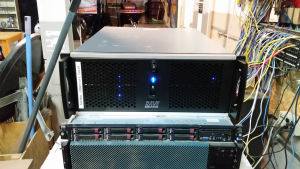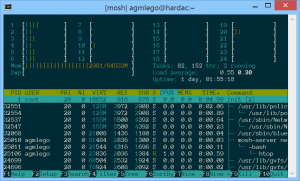Computational Infrastructure Upgrades
i3Detroit has been the fortunate recipient over its existence of several generations of donated enterprise-grade hardware, and has been running a pretty decent network.
The network computers serve several purposes:
- Running our phones with a VM of Asterisk PBX
- Managing space infrastructure, like the power meter that helps us split the power bill with our building mates
- Running tool-specific VMs for various CNC machines around the space
The usual suspects show up: the HP Proliant DL360 G5, the mystery box that probably has Athlons in it, a pile of Cisco green labeled MARS.
This pile of cobbled-together aging hardware has served us well over the years, but in a flurry of failing hardware, the shockingly exponential price curve of DDR and DDR2 RAM, the increasingly-notable power draw of old hardware…it was time for a change.
A series of specifications were drafted. The machine needed to have a lot of cores and a lot of RAM for the virtual machines it would run. It needed to have a lot of disk space to bring about the space-wide file share, dreamed about for years. It needed to be more power-efficient than the current stack. It needed to be quieter than the current stack. It needed to be designed to survive our semi-industrial environment. And, most of all, it needed to be expandable so it could grow as we did.
Once the specs were polished, a formal quote was requested from RAVE Computers, a custom-PC shop in Sterling Heights specializing in high-performance machines for harsh environments. RAVE came back with a few options, and discussion was had internally.
Finally, a machine was selected and ordered. Patient waiting brought us a delivered machine a few weeks later…
hardac.i3detroit.local, at home and happy
As delivered, the machine has:
- (2) Intel Xeon E5-2630V2 processors
- (6) cores each, 2.6GHz base with Turbo Boost to 3.1GHz
- 15MB cache
- HyperThreading enabled
- All the virtualization technology
- 64 GB ECC DDR3 RAM
- 4 TB live storage
- (4) 2 TB SATA drives
- LSI MegaRaid performing RAID6 operations
- 300W maximum power draw at full stress
- 120-160W draw at unconstrained idle
- All the power controls in BIOS
- A 4U case for bigger, quieter fans
We immediately began to get the operating system set up on it, and the various virtual machines migrated to it from the retiring machines. The first challenge is always one of the most critical: what hostname should the machine have?
With some discussion, we settled on HARDAC, since the centrally-mounted brilliant blue power LED is vaguely reminiscent of HARDAC’s red light. (Or, maybe tempting fate with yet another evil-AI name was the motivation. Who knows?)
After nearly 10 hours of configuration and setup, we can stand back and see what modern hardware can do with our current typical load:
hardac.i3detroit.local running htop, barely breaking a sweat under load
Thanks to RAVE, our commons area is quieter, our power bill is less, and our volunteer team of sysadmins is a little bit more sane.



Leave a Reply
Want to join the discussion?Feel free to contribute!